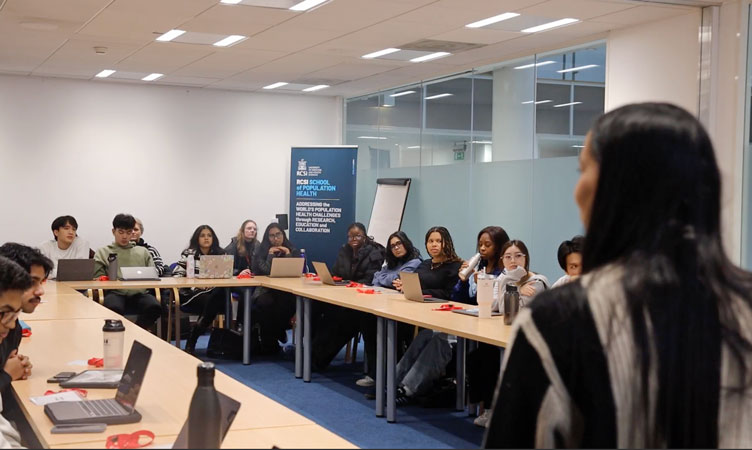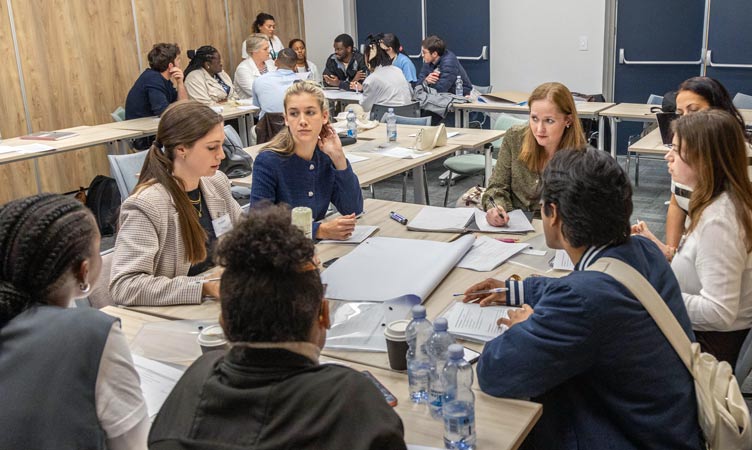A pioneering research methods-specific global surgery course, Essential Research Skills: A Global Surgery Perspective, developed by RCSI University of Medicine and Health Sciences and Stellenbosch University in South Africa, has been launched in Cape Town and Dublin.
Dr Jakub Gajewski, Director of the Research Programme of the RCSI Institute of Global Surgery, explains the course’s significance.
I have attended my fair share of research courses over the years. And, to be honest, most of them were incredibly dull. Too much lecturing, too little interaction, and a complete lack of practical application. I knew there had to be a better way.
So, when we at the RCSI Institute of Global Surgery started developing a new research-specific global surgery course with Stellenbosch University, I had one clear goal in mind: to create something dynamic, engaging, and, above all, useful. We wanted to offer students and professionals a real-world introduction to research – something they could take with them beyond the classroom and apply directly to their own work. I also believe the type of work that we do can inspire the younger generation, so I wanted to share with them as much of our experience as possible.
The result came out after three years of work – The Essential Research Skills: A Global Surgery Perspective course. We launched it in Cape Town and Dublin, bringing together students and faculty from both universities to create a unique learning experience. This is the first course of its kind in the world and the first example of a student-academic collaboration in global surgery crossing borders.
Interactive and practical
My colleague Dr Chiara Pittalis, RCSI academic co-lead, emphasised the course’s importance, stating that the collaborative nature of this course not only bridges the gap between theory and practice but also fosters a cross-cultural exchange that enhances the learning experience for both students and faculty. By working together, we’ve created an innovative model for teaching research that goes beyond conventional methods and challenges participants to get out of their comfort zone.
From the outset, we adopted the Socratic teaching method – maieutic – focusing on discussion, critical thinking and real-world case studies. No endless lectures. No passive learning. Instead, we built an interactive and practical course where participants could truly engage with the material.
Our approach worked. In September 2024, 30 students took part in the course at Stellenbosch University, followed by another 25 in February 2025 at RCSI. The response was overwhelmingly positive. As my collaborator, Professor Kathryn Chu from Stellenbosch University pointed out, global surgery is still an unfamiliar topic for many medical students. They may have learned research methods in a classroom setting, but they often struggle to apply them in real-world situations. That’s exactly the gap we aimed to fill.
Unforgettable experiences
To make the course immersive, we incorporated educational games, group discussions, and interactive learning sessions. We encouraged open dialogue, knowledge sharing and collaboration. We also incorporated an educational escape room challenge that was very well received.
We designed it to be more than just a fun activity – it was an intense, high-pressure exercise that required teamwork, critical thinking and problem-solving. All tasks were based on course content, so participants reinforced their learning while having an unforgettable experience.
The best way to illustrate the impact of the course is by sharing some examples of what students told us about it:
“This is a great course to get an understanding of what research and global surgery is. It has been very enlightening and has taught me that you need to think broadly when doing research and that you need to think on your feet and engage a lot with the communities that you are working with.” (Markus Nel, a medical student at Stellenbosch University).
“I think I can apply the skills I have learnt in this course to any kind of research project that I want to do in the future.” (Kamili Le Blanc, a medical student at RCSI).
“I would definitely recommend this course to anyone interested in research and Global Surgery, and in making an impact.” (Nthabeleng Mapohoshe, final year medical student at Stellenbosch University).
These are some of the reasons why we have created this course. And I hope we will be able to roll it out with more students in the future.
The development of this course has been supported by the Erasmus+ programme and the Student Engagement and Partnership (StEP) programme. In the National Student Engagement Programme, this case features as a case study.
 Dr Jakub Gajewski, Director of the Research Programme of the RCSI Institute of Global Surgery.
Dr Jakub Gajewski, Director of the Research Programme of the RCSI Institute of Global Surgery.
RCSI is committed to achieving a better and more sustainable future through the UN Sustainable Development Goals.
![]()
![]()
![]()



